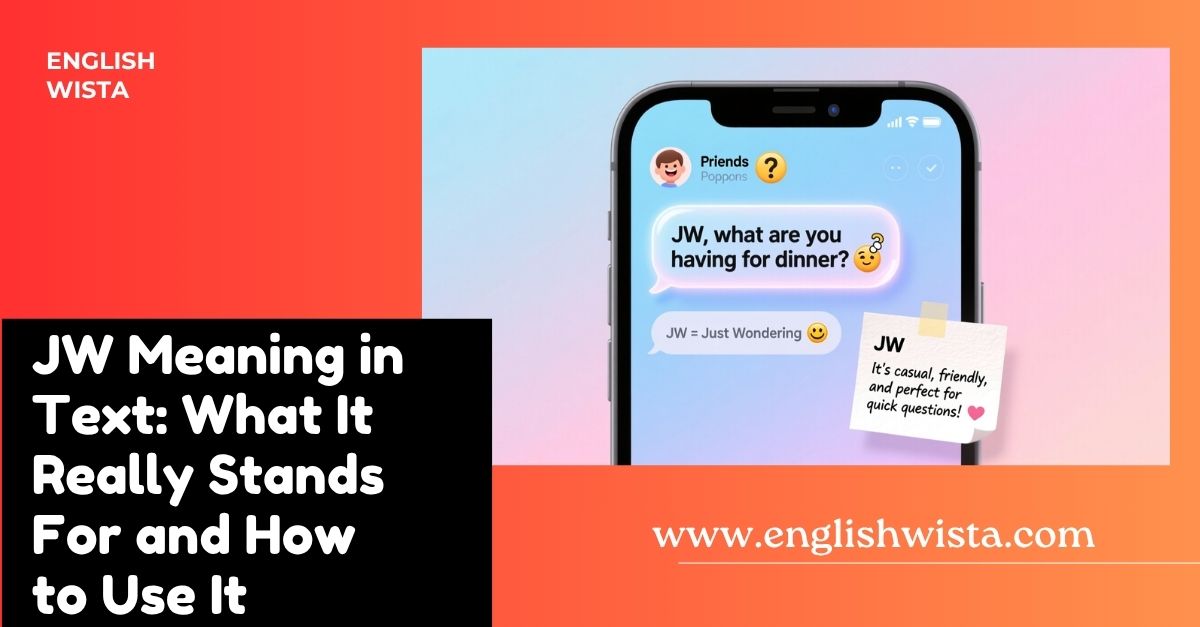Have you ever been scrolling through a text, a chat, or maybe a comment on social media and suddenly come across the letters “JW”? At first glance, it can feel confusing. Is it an abbreviation for a person’s name? Is it internet slang? Or maybe something else entirely?
If you’ve ever wondered about the meaning of “JW,” don’t worry you’re not alone. Many people stumble across this little abbreviation and scratch their heads. The good news is that “JW” is simple to understand once you learn its meaning. And that’s exactly what we’ll explore in this article.
We’ll break down what “JW” means, how it’s used in texting and chatting, common situations where you might see it, and even some fun facts. By the end, you’ll feel confident using it yourself or at least understanding what your friends are saying when they drop it in a message.
So, let’s dive in and discover the world of “JW.”
What Does “JW” Mean in Text?
At its core, “JW” stands for “Just Wondering.”
It’s a casual, short way of telling someone that you’re curious about something. Instead of typing out the full phrase, people just write “JW.” It saves time, feels lighter, and matches the quick nature of texting.
For example:
- “JW, what time are you getting off work?”
- “Are you busy tomorrow? JW.”
As you can see, it’s usually placed at the end of a question or sentence to show that you’re asking out of curiosity rather than making a demand.
Why Do People Use “JW” Instead of Writing It Out?
Texting is all about being fast and convenient. Abbreviations like “JW” save space and time. Writing “just wondering” takes up 12 characters, while “JW” only takes 2.
But it’s not only about saving time it’s also about tone. “JW” makes the message feel softer and less pushy.
Compare these two:
- Without abbreviation: “What are you doing later?”
- With abbreviation: “What are you doing later, JW?”
The second version feels less like an interrogation and more like a light, casual curiosity. It softens the question.
How Is “JW” Used in a Conversation?
The meaning of “JW” depends a little on the context, but it usually shows up in these situations:
- Curiosity without urgency
- Example: “JW, what’s your favorite food?”
- Asking without pressure
- Example: “When’s the party? JW.”
(This shows you’re not being pushy you just want to know.)
- Example: “When’s the party? JW.”
- Making a conversation opener
- Example: “JW, have you ever been to New York?”
(Here, it works as an icebreaker.)
- Example: “JW, have you ever been to New York?”
- Checking small details
- Example: “JW, do you still have my book?”
Does “JW” Always Mean “Just Wondering”?
Mostly, yes. In casual texting, that’s the standard meaning.
But keep in mind: abbreviations can have multiple meanings depending on the context.
Some other possible meanings for “JW” are:
- Jehovah’s Witness (a religious group)
- John Wick (the movie character)
- Java Web (in technology discussions)
However, in most personal chats, “JW” almost always means “Just Wondering.” If you’re texting a friend and they send “JW,” they’re probably not talking about John Wick or software engineering.
How Can You Tell Which Meaning Is Correct?
The key is context.
- If you’re chatting with a friend about weekend plans and they say “JW,” it means “Just Wondering.”
- If you’re reading an article about movies and see “JW,” it might mean “John Wick.”
- If you’re in a tech forum, “JW” might stand for “Java Web.”
Always look at the sentence around it. That will give you the answer.
Example Sentences with “JW”
To make this clearer, let’s look at more examples of how people actually use “JW” in text.
- Planning:
- “JW, are you free Friday night?”
- “What time are you leaving tomorrow? JW.”
- Casual conversation:
- “JW, do you like horror movies?”
- “Have you ever tried sushi? JW.”
- Checking small details:
- “JW, did you get my email?”
- “Which bus do you take to work? JW.”
- Light questions:
- “JW, what’s your favorite color?”
- “How old is your cat, JW?”
Notice how in each case, “JW” makes the question sound a little more casual and easy-going.
Is “JW” Formal or Informal?
“JW” is very informal.
It belongs in text messages, casual chats, or social media comments. You wouldn’t normally use it in professional emails, job applications, or business settings. In those cases, it’s better to write the full “just wondering” or rephrase the sentence more politely.
For example:
- Casual (texting a friend): “JW, are you coming to the party?”
- Formal (emailing a coworker): “I was just wondering if you’ll be attending the meeting tomorrow.”
When Should You Use “JW”?
Here are a few perfect times to use it:
- When you want to ask something without sounding too serious.
- When you’re making small talk.
- When you’re asking out of curiosity, not necessity.
- When texting friends, siblings, or people you’re comfortable with.
But avoid it in these cases:
- In school essays or official documents.
- When talking to your boss in a professional email.
- When you need to sound serious or respectful.
Fun Facts About “JW”
- Internet culture: Abbreviations like “JW” became popular with the rise of instant messaging and texting in the early 2000s. People wanted quicker ways to type.
- Softening tone: Linguists often point out that abbreviations like this act like “tone markers.” They help messages sound lighter, less demanding, and more playful.
- Not universal: While “JW” is common in English texting, people in other languages may use different short forms for “just wondering.”
Common Confusions with “JW”
Because “JW” is so short, people sometimes confuse it with other abbreviations. Let’s clear a few of those up.
- JW vs. JW.org
- “JW” in texting = “Just Wondering.”
- “JW.org” = the official website for Jehovah’s Witnesses.
- JW vs. JW (movies)
- In chats about films, “JW” can mean “John Wick” or “Jurassic World.” Context is everything!
- JW vs. IDK
- “JW” = asking a question (curiosity).
- “IDK” = answering with “I don’t know.”
Quick Recap: Key Points to Remember
- “JW” in text almost always means “Just Wondering.”
- It makes questions feel softer, lighter, and more casual.
- Use it with friends or in informal chats, not in formal settings.
- Always check context sometimes it can mean something else (like Jehovah’s Witness, John Wick, or Jurassic World).
- Example: “JW, are you free later?”
Conclusion
So, what does “JW” mean in text? The simple answer: “Just Wondering.”
It’s one of those little abbreviations that make texting faster and friendlier. Instead of writing out the whole phrase, you can just say “JW” to show you’re asking a casual, curiosity-based question.
Remember: keep it informal, use it with friends, and always check the context. Once you get the hang of it, you’ll see “JW” everywhere in texts, comments, and group chats. And now, when you do, you won’t be scratching your head you’ll know exactly what it means.
So next time you’re curious about something small, go ahead and type:
“JW, what are you having for dinner?”
It’s quick, easy, and perfectly friendly.



